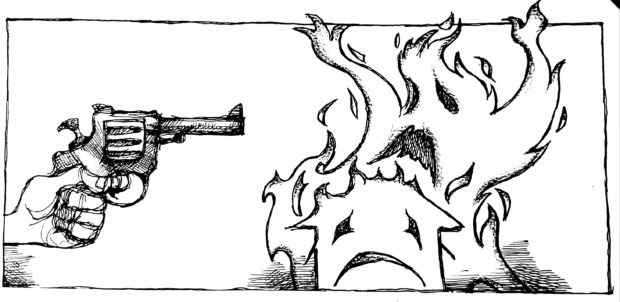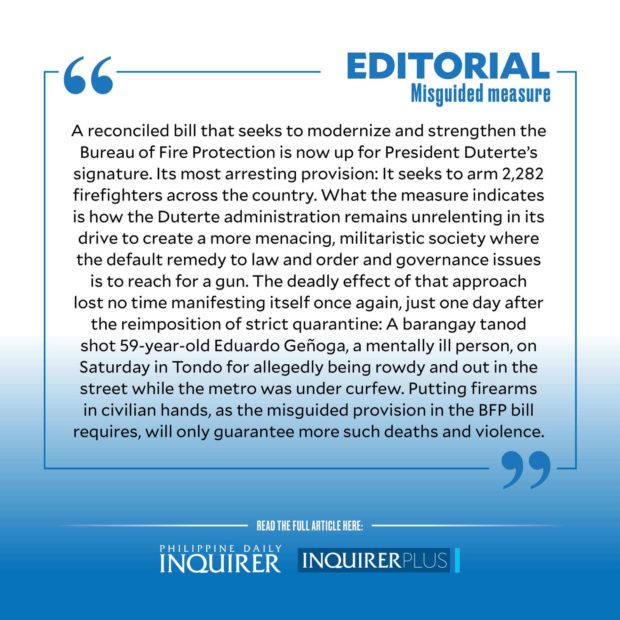Misguided measure

After much wrangling and back and forth, a reconciled bill that seeks to modernize and strengthen the Bureau of Fire Protection (BFP) is now up for President Duterte’s signature. Its most arresting provision: It seeks to arm 2,282 firefighters across the country.
Mr. Duterte is not expected to hesitate signing the proposed Bureau of Fire Protection Modernization Act, one of the priority measures mentioned in his sixth and last State of the Nation Address. After all, the contentious provision on the setting up of a Security and Protection Unit (SPU) in each of the 17 fire regional offices and 146 city fire stations was largely his brainchild.
During the BFP’s 28th anniversary in 2019, Mr. Duterte told the BFP, a civilian agency attached to the Department of the Interior and Local Government, that they had to participate in the government’s anti-insurgency operations and “help in the law and order.”
“You are not limited to just fire. You have to go around and help the policemen and the military… kill the enemy,” the President said.

Sen. Bong Go, principal author of Senate Bill No. 1832, took his cue from that and pushed for an amendment to the BFP modernization bill authorizing the arming of firefighters. Another Duterte lieutenant, Sen. Ronald dela Rosa, chair of the Senate committee on public order and dangerous drugs, dutifully shepherded the approval of the committee report and defended its controversial provision.
That amendment had been suddenly inserted in March, and at that time it was quickly rejected by the Senate. But discussions at the bicameral level had apparently forged a compromise, leading to the reconciled bill.
Go cheered the final bill that kept the provision on arming the firefighters, insisting that security is “a serious concern of the BFP on the ground, especially in volatile environments” when they are faced with “unruly” people. “They can only effectively suppress fires and save lives if peace and order is in place and they are also protected from unruly elements.”
Under the Fire Code of the Philippines, however, law enforcement agencies such as the PNP, with its people trained to use firearms safely and properly, are already mandated to provide the “necessary assistance” to the BFP so it can fulfill its mandate to “prevent and suppress destructive fires” and protect human lives and property.
The Senate initially rejected the bicameral conference committee report in June, because it still contained the provision on arming firefighters that was already rejected in March. To make the SPU provision more palatable to the Senate, the House and the Senate panels then agreed, after a “lengthy and extensive discussion,” that only 14 firefighters for every fire regional office and city station would be authorized to carry firearms as members of the SPU. That meant a total of 2,282 firefighters or 7.9 percent of the 32,800 total personnel strength of the BFP. The designated armed firefighters will be required to undergo neuropsychological examinations and periodic trainings.
The compromise was seen as a downgrade from the earlier provision for all the firefighters to bear arms and perform “quasi-police functions.” With it, the Senate finally ratified last week the reconciled committee report.
Despite the concessions put in place in the final version of the bill, however, which mainly aims to further develop the capabilities of firefighters through the purchase of equipment for fire suppression, prevention, and investigation, serious concerns remain.
There’s the expense that will go into the purchase of guns—P79.87 million for the short firearms, according to Dela Rosa—and the proficiency training of officers, not to mention the reconfiguration of firehouses for the secure storage of the firearms and ammunition. By mandate, fire stations should be open for quick, unimpeded response to emergency situations.
In objecting to the report, Senate President Pro Tempore Ralph Recto described it as a “misplaced priority,” while Senate Minority Leader Franklin Drilon said he remained unconvinced that arming a civilian unit is justified.
What the measure indicates is how the Duterte administration remains unrelenting in its drive to create a more menacing, militaristic society where the default remedy to law and order and governance issues is to reach for a gun.
The deadly effect of that approach lost no time manifesting itself once again, just one day after the reimposition of strict quarantine: A barangay tanod shot 59-year-old Eduardo Geñoga, a mentally ill person, on Saturday in Tondo for allegedly being rowdy and out in the street while the metro was under curfew.
Village officials are not allowed to carry arms; but Mr. Duterte had remarked in June 2018 that even they should carry arms and participate in his pet war on drugs. Putting firearms in civilian hands, as the misguided provision in the BFP bill requires, will only guarantee more such deaths and violence.




















